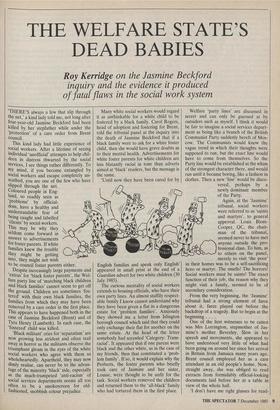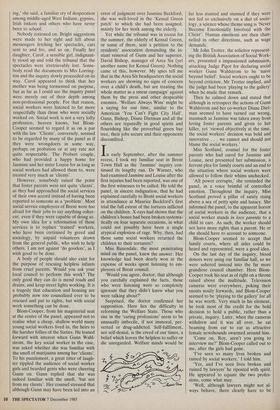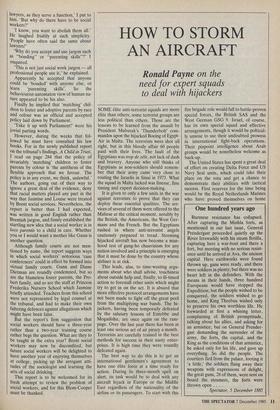THE WELFARE STATE'S DEAD BABIES
Roy Kerridge on the Jasmine Beckford
inquiry and the evidence it produced of fatal flaws in the social work system
`THERE'S always a few that slip through the net,' a kind lady told me, not long after four-year-old Jasmine Beckford had been killed by her stepfather while under the `protection' of a care order from Brent council.
Despite increasingly large payments and extras' for 'black foster parents', the Wel- fare party line of 'matching black children and black families' cannot seem to get off the ground. Children are sometimes 'fos- tered' with their own black families, the families from which they may have been removed by a care order in the first place. This appears to have happened both in the case of Jasmine Beckford (Brent) and of Tyra. Henry (Lambeth). In each case, the `fostered' child was killed.
'Black militant' cries for 'separatism' are now growing less strident and often trail away in horror as the militants observe the triumphant gleam in the eyes of the white social workers who agree with them so wholeheartedly. Apartheid, they may now dimly realise, can never be to the advan- tage of the minority 'black' side, especially as the much-trumpeted 'anti-racism' of social services departments seems all too often to be a smokescreen for old- fashioned, snobbish colour prejudice. Many white social workers would regard it as unthinkable for a white child to be fostered by a black family. Carol Rogers, head of adoption and fostering for Brent, told the tribunal panel at the inquiry into the death of Jasmine Beckford that if a black family were to ask for a white foster child, then she would have grave doubts as to their mental health. Advertisements for white foster parents for white children are less blatantly racial in tone than adverts aimed at `black' readers, but the message is the same.
`Until now they have been cared for by families and speak only English' appeared in small print at the end of a Guardian advert for two white children (30 July 1985). The curious mentality of social workers extends to housing officials, who have their own party lines. An almost stuffily respect- able family I know cannot understand why they have been given a flat in a dangerous estate for 'problem families'. Anxiously they showed me a letter from Islington borough council which said that they could only exchange their flat for another on the same estate. At the head of the letter somebody had scrawled `Category: Trans- racial'. It appeared that if one parent were black and the other white, as in the case of my friends, then that constituted a 'prob- lem family'. If so, it would explain why the Proberts, the foster parents who briefly took care of Jasmine and her sister, Louise, were thought to be unfit for the task. Social workers removed the children and returned them to the 'all-black' family who had tortured them in the first place. Welfare `party lines' are discussed in secret and can only be guessed at by outsiders such as myself. I think it would be fair to imagine a social services depart- ment as being like a branch of the British Communist Party suddenly bereft of Mos- cow. The Communists would know the vague trend in which their thoughts were supposed to run, but the exact line would have to come from themselves. So the Party line would be established at the whim of the strongest character there, and would run until it became boring, like a fashion in clothes. Then a new `line' would be disco- vered, perhaps by a newly dominant member of the Party.
Again, at the 'Jasmine' tribunal, social workers were referred to as 'saints and martyrs', to general approval. Louis Blom- Cooper, QC, the chair- man of the tribunal, seemed never to have met 4,*0 anyone outside the pro- fessional class. To him, as 4 to others on the panel, merely to visit 'the poor' in their homes was to be a self-sacrificing hero or martyr. The smells! The horrors! Social workers must be saints! The exact function of their job, the reason why they might visit a family, seemed to be of secondary consideration.
From the very beginning, the `Jasmine' tribunal had a strong element of farce about it, farce played out before the backdrop of a tragedy. But to begin at the beginning . . . .
One of the first witnesses to be called was Mrs Lorrington, stepmother of Jas- mine's mother Beverley. Slow in her speech and movements, she appeared to have understood very little of what had been going on around her since her arrival in Britain from Jamaica many years ago. Brent council employed her as a care attendant in an old people's home. Now, straight away, she was obliged to read extracts from formidably official-looking documents laid before her at a table in view of the whole hall.
`I don't have me right glasses for read-
ing,' she said, a familiar cry of desperation among middle-aged West Indians, gypsies, Irish tinkers and others who have never been to school.
Nobody cottoned on. Bright suggestions were made to her right and left about messengers fetching her spectacles, cars sent to and fro, and so on. Finally her daughter, Carol, a sensible girl, indignant- ly stood up and told the tribunal that the spectacles were irretrievably lost. Some- body read the documents to Mrs Lorring- ton and the inquiry slowly proceeded on its way. Carol appeared to think that her mother was being tormented on purpose, but as far as I could see the inquiry panel were merely out of their depth among non-professional people. For that reason, social workers were listened to far more respectfully than those who were socially worked on. Social work is not a very lofty profession, heaven knows, but Blom- Cooper seemed to regard it as on a par with the law. 'Clients', conversely, seemed to be regarded by many of the panel as if they were wrongdoers in some way, perhaps on probation or at any rate not quite respectable. The Probert couple, who had provided a happy home for Jasmine and her sister Louise for as long as social workers had allowed them to, were treated very much as 'clients'.
However, somebody raised the point that foster parents were not quite 'clients', as they had approached the social services of their own accord instead of having been reported to someone as a 'problem'. Most social service employees of Brent were too afraid for their jobs to say anything coher- ent, even if they were capable of doing so. My own idea for a reformation of these services is to replace 'trained' workers, who have been cretinised by greed and sociology, by unpaid volunteers drawn from the general public, who wish to help others. I am not against 'do gooders', as I wish good to be done.
A body of people should also exist for the purpose of rescuing helpless infants from cruel parents. Would you ask your local council to perform this work? The only good they can do is mend roads and drains, and keep street lights working. It is a tragedy that education and housing are probably now too councilised ever to be rescued and put to rights, but with social work something can be done.
Blom-Cooper, from his magisterial seat at the centre of the panel, appeared not to realise what a cheap, shallow world many young social workers lived in, the heirs to the harsher follies of the Sixties. He leaned forward with interest when Gunn Wahl- strom, the key social worker in the case, was asked whether she was familiar with the smell of marijuana among her 'clients'. To his puzzlement, a great titter of laugh- ter rippled the audience of social worker girls and bearded gents who were cheering Gunn on. Gunn replied that she was indeed familiar with the smell, 'but not from my clients'. Her counsel stressed that although Gunn may have been led into an error of judgment over Jasmine Beckford, she was well-loved in the `Kensal Green patch' to which she had been assigned, mainly for her work among the elderly.
Yet while the tribunal was in recess for the summer, the elderly of Kensal Green, or some of them, sent a petition to the residents' association demanding the in- stant removal of Gunn and her superior, David Bishop, manager of Area Six (yet another name for Kensal Green). Nothing came of this, however. My spies tell me that in the Area Six headquarters the social workers are showing no signs of concern over a child's death, but are treating the whole matter as a smear campaign' against them by the press and other despicable enemies. 'Welfare Always Wins' might be a saying for our time, similar to the American 'You Can't Fight City Hall'. Gunn, Bishop, Diane Dietman and all the others are reputedly in good spirits and flourishing like the proverbial green bay tree, their jobs secure and their opponents discomfited.
In early September, after the summer recess, I took my familiar seat in Brent Town Hall as the 'Jasmine' inquiry con- tinued its lengthy run. Dr Warner, who had examined Jasmine and Louise after the first injuries had been reported, was one of the first witnesses to be called. He told the panel, in sincere indignation, that he had explained carefully to Brent social workers in attendance at Maurice Beckford's first trial the full extent of the tortures inflicted on the children. X-rays had shown that the children's bones had been broken systema- tically on four separate occasions, in what could not possibly have been a single atypical explosion of rage. Why, then, had those same social workers returned the children to their torturers?
Miss Baxendale, the most penetrating mind on the panel, knew the answer. Her knowledge had been dearly won at the expense of weeks spent listening to em- ployees of Brent council.
`Would you agree, doctor, that although you carefully explained the facts, those who were listening were so completely ignorant that they didn't know what you were talking about?'
Surprised, the doctor confirmed her supposition. Here lies the difficulty in reforming the Welfare State. Those who rise in the 'caring professions' seem to be unusually imbecile, if not immoral, per- verted or drug-addicted. Self-fulfilment, not self-denial, is the creed of our times, a belief which leaves the helpless to suffer or die unregarded. Welfare minds would be far less stunted and stunned if they were not fed so exclusively on a diet of socio- logy, a science whose theme song is 'Never Become Emotionally Involved with the Client'. Human emotions are then chan- nelled in other directions, such as wage demands.
Mr John Trotter, the solicitor represent- ing the British Association of Social Work- ers, presented a impassioned submission, attacking Judge Pigot for declaring social worker Gunn Wahlstrom to be 'naive beyond belief. Social workers ought to be beyond criticism, Mx Trotter implied, and the judge had been 'playing to the gallery' when he made that remark.
Then he calmed down and stated that although in retrospect the actions of Gunn Wahlstrom and her co-worker Diane Diet- man seemed to have turned out wrong, inasmuch as Jasmine was taken away from loving foster parents and given to her killer, yet 'viewed objectively at the time, the social workers' decision was bold and innovative . . we cannot and should not blame the social workers.'
Miss Scotland, counsel for the foster parents who had cared for Jasmine and Louise, next presented her submission, a fervent plea for family courts and an end to the situation where social workers were allowed to follow their whims unchecked.
`All power corrupts,' she reminded the panel, in a voice brimful of controlled emotion. Throughout the inquiry, Miss Scotland proved a pillar of sanity rising above a sea of petty spite and lunacy. She informed the panel, to the apparent horror of social workers in the audience, that a social worker stands in loco parentis to a child in care. As such, the worker should not have more rights than a parent. He or she should have to account to someone.
Blom-Cooper seemed to accept that family courts, where all sides could be heard and represented, were a good idea.
On the last day of the inquiry, blood donors were using our familiar hall, so we were ushered instead into the far more grandiose council chamber. Here Blom- Cooper took his seat as of right on a throne raised above the multitude. Television cameras were everywhere, poking their snouts nosily forwards, and Blom-Cooper seemed to be 'playing to the gallery' for all he was worth. Very much in his element, he took most of the credit for the bold decision to hold a public, rather than a private, inquiry. Later, when the cameras withdrew and it was all over, he sat beaming from ear to ear as attractive female newshounds swarmed around him.
`Come on, Roy, aren't you going to interview me?' Blom-Cooper called out to me, after the girls had gone.
`I've seen so many lives broken and ruined by social workers,' I told him.
`Yes, and I've seen lives broken and ruined by lawyers' he riposted with spirit. He appeared to equate the two profes- sions, come what may.
`Well, although lawyers might not al- ways behave, there clearly have to be lawyers, as they serve a function,' I put to him. `But why do there have to be social workers?'
`I know, you want to abolish them all.' He laughed fruitily at such simplicity. 'People have often said the same about lawyers!'
'Why do you accept and use jargon such as "bonding" or "parenting skills"?' I enquired.
`This is not just social work jargon — all professional people use it,' he explained.
Apparently he accepted that anyone could be `bonded' with anyone else, or learn 'parenting skills'. So the behaviourist-automaton view of human na- ture appeared to be his also.
Finally he implied that 'matching' chil- dren to foster and adoptive parents by race and colour was an official and accepted policy laid down by Parliament.
`Take it up with Parliament!' were his jovial parting words.
However, during the weeks that fol- lowed he must have consulted his law books. For in the newly published report on the tribunal's findings, A Child in Trust, I read on page 284 that the policy of invariably 'matching' children to foster parents by colour is 'the antithesis of the flexible approach that we favour. The policy is in any event, we think, unlawful.' The authors, going out of their way to ignore a great deal of the evidence, deny that racial matters played any part in the way that Jasmine and Louise were treated by Brent social services. Nevertheless, the report is better than I had expected, was written in good English rather than Brentish jargon, and firmly established the startling new idea that a social worker is in loco parentis to a child in care. Whether you or I would want a mother like Gunn is another question.
Although family courts are not men- tioned by name, the report suggests ways In which social workers' notorious 'case conferences' could in effect be formed into virtual family courts. Gunn and Diane Dietman are roundly condemned, but so are the blameless foster parents, the Pro- bert family, and so are the staff at Princess Frederika Nursery School which Jasmine briefly attended. Teachers from this school were not represented by legal counsel at the tribunal, and •had to make their own faltering defences against allegations which might have been false.
But the report's firm suggestion that social workers should have a three-year rather than a two-year training course rather begs the question. What are they to be taught in the extra year? Brent social workers may now be discomfited, but future social workers will be delighted to have another year of enjoying themselves at college, picking up the arrogant atti- tudes of the sociologist and learning the arts of social drinking.
This report is to be welcomed for its fresh attempt to review the problem of social workers, and for this Blom-Cooper must be thanked.




































































 Previous page
Previous page